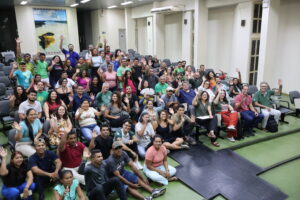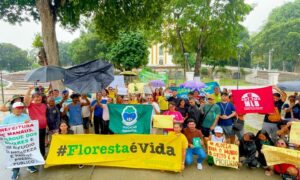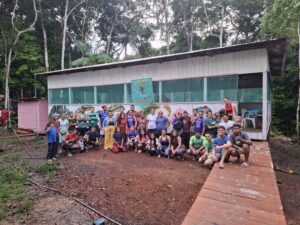The Ordinary General Assembly of the Association of Agroextractivist Residents of the Lower Mid-Juruá (AMAB, in Portuguese) brought together more than 100 people, including community members and partner organizations, to render accounts, elect a new presidency, and draw up strategies to strengthen the association
By Thais Vieira Alves
On March 13 and 14, 2023, the General Assembly of the Association of Agroextractivist Residents of the Lower Mid-Juruá – AMAB took place in the community of Lago Serrado. An important event that brought together 116 people from the territory in a collective planning for the Association that is growing every day and achieving great successes.
The Association, created in 2014 with the purpose of defending social rights of the populations in the Fisheries Agreement area around the Mid-Juruá Conservation Units, emerges today as a reference for other locally based associations, recognized for its work, transparency, and fair and equitable distribution of benefits between community members and communities.
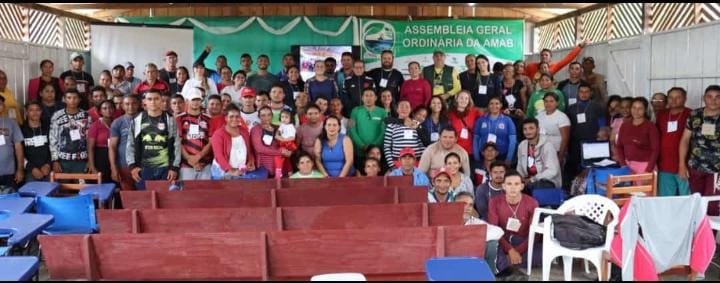
Several institutions participated in the experience exchange and participatory planning. The Carauari Health Department offered health care during the event and also shared that a boat from Brazil’s Unified Public Health System (SUS) will be in the communities to provide maternity assistance and spread knowledge of maternity rights on April 24th. Gilberto Olavo, DEMUC/SEMA’s representative, highlighted the importance of the Fisheries Agreement revision process in the Mid-Juruá region to include communities that are not contemplated in the fishing order, as well as to continue fishing activities by traditional communities.
AMAB’s flagship is the commerce of arapaima and other fishes. Fernanda Moraes, the president of the association, points out that the “work of counting arapaima with the inclusion of women made all the difference”. The II Arapaima Counting Workshop for Women, which took place in September 2022 in a partnership between Instituto Juruá and AMAB, brought great benefits. Almira, the local coordinator of Instituto Juruá, pointed out the planning of another counting workshop for women in the fisheries agreement area, this time including indigenous women.
In addition to feedback on projects that were completed and those that are still in execution by AMAB, the meeting also had a moment for board change. Fernanda reflects on the journey ahead of the Association: “These two years comprised a lot of learning by representing 100 women, a total of 128 people, and 100 families through the work of AMAB to improve the communities’ quality of life”.
The election for the 2023-2026 term took place through a voting process with a single party that was elected and sworn in, resulting in a woman in the presidency once more. Fernanda Moraes will fulfill the new term and she reports that “being president does not mean being a person full of power, but full of responsibility and commitment”. She recalled the results achieved and presented in the assembly, from management to Couple’s Meeting.
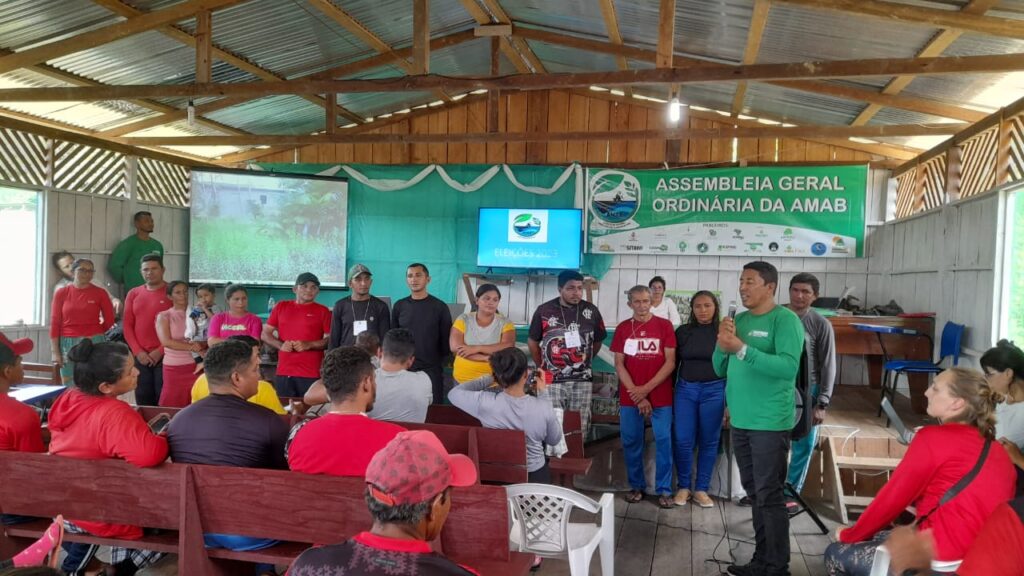
Instituto Juruá’s local coordinator and vice-president of the Electoral Commission, Almira Nascimento reflects that “the AMAB assembly was a moment of transparency, celebration for the results of everyone’s efforts. It was a moment to demonstrate our weaknesses and affirm why we are here and why we fight”.
Finally, with an eye on the horizon, AMAB emerges as an organization that challenges conventional standards and materializes sustainability in the territory in several ways through strategic planning and collective decision-making.
The assembly was supported by communities and institutions such as: Instituto Juruá (IJ), Association of Rural Producers of Carauari (ASPROC), Institute for Sustainable Agricultural and Forestry Development of the State of Amazonas (IDAM), Chico Mendes Institute for Conservation of Biodiversity (ICMBIO), State Department for Environment (SEMA/DEMUC), Mid-Juruá Benefit Sharing Fund (FRBMJ), Association of Agroextractivist Residents of Lower Mid-Juruá (AMAB), Carauari City Hall, Youth Center, Mid-Juruá Territory Forum (FTMJ), Sitawi Finance for Good, and Lago Serrado and São João communities.

